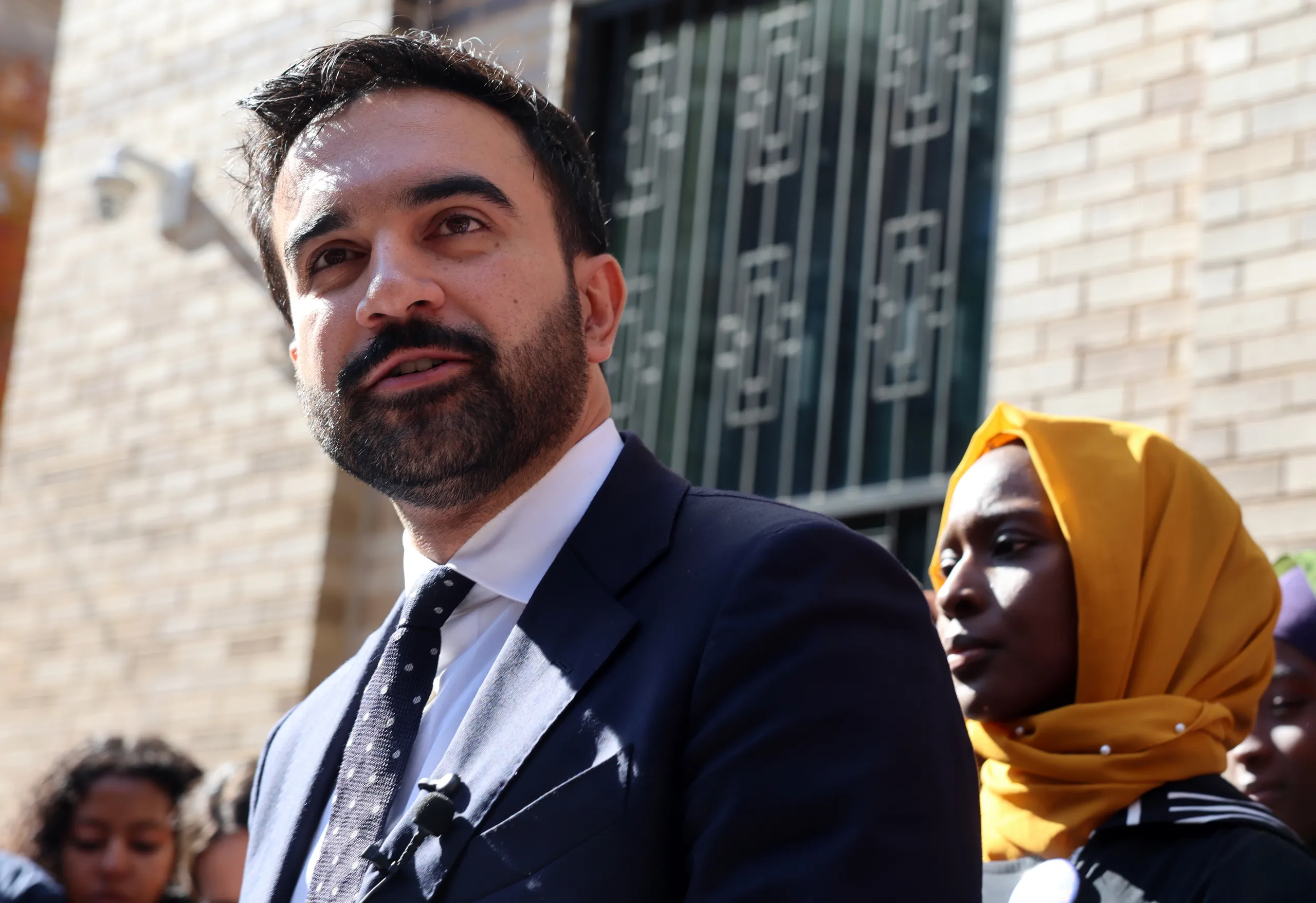Zohran K. Mamdani, a 34-year-old state assemblyman from Queens and self-described democratic socialist, has made history by winning New York City’s mayoral election, becoming the first Muslim and first South-Asian American to lead America’s largest city. His victory marks a generational and ideological shift in the city’s political landscape, ushering in a new era of progressive policymaking that will soon be tested against national headwinds, fiscal pressures, and the realities of governing one of the world’s most complex urban centers.
Mamdani, who will officially assume office on January 1, 2026, succeeds Mayor Eric Adams after a hard-fought campaign that pitted grassroots activism against establishment politics. Running on a platform centered on what he calls “New York’s cost-of-living crisis,” Mamdani pledged to tackle soaring rents, expand affordable housing, and deliver universal child care — while reimagining public safety and strengthening the city’s social safety net.
A Landmark Election in a Changing City
The 2025 mayoral race captivated national attention. Mamdani, a two-term New York State Assembly member representing Astoria, Queens, emerged as a major political force after uniting a diverse coalition of working-class voters, progressive Democrats, labor unions, and immigrant communities. He defeated former governor Andrew Cuomo by a comfortable margin, according to the Associated Press, which officially called the race late on election night.
His victory signals a decisive shift in New York politics. Once a bastion of centrist Democrats, the city’s electorate has grown more progressive over the past decade, reflecting demographic change and frustration with economic inequality. Mamdani’s win also cements the growing influence of democratic socialism within local politics, following in the footsteps of figures like Alexandria Ocasio-Cortez, whose district overlaps with Mamdani’s.
“Tonight, New York has chosen a new path,” Mamdani said in his victory speech in Queens. “We are writing the next chapter in this city’s story — one where every New Yorker can afford to live, thrive, and dream.”
Background and Rise
Born in Kampala, Uganda, to Indian parents who immigrated to the United States when he was a child, Mamdani was raised in New York City and educated at Bowdoin College in Maine. Before entering politics, he worked as a foreclosure prevention counselor and community organizer. His activism, particularly around housing and criminal justice reform, laid the foundation for his political career.
He was first elected to the New York State Assembly in 2020, representing the 36th District. There, he built a reputation as a sharp policy thinker and outspoken advocate for tenants’ rights, climate justice, and affordable transit. He played a key role in pushing for the state’s “Good Cause Eviction” legislation and free bus service pilots in New York City.
Mamdani’s political style combines idealism with practical organizing. He often cites his mother, filmmaker Mira Nair, as an influence on his worldview, blending global awareness with an emphasis on local solidarity. “Politics should be about imagination,” he told The Guardian earlier this year. “We must imagine what our city could be if we built it for everyone.”
Core Agenda: Tackling the Cost of Living
The central promise of Mamdani’s campaign was to confront what he repeatedly called a “cost-of-living crisis.” Over the past decade, New Yorkers have faced escalating rents, stagnant wages, and growing inequality. Mamdani’s platform proposes sweeping measures aimed at easing those burdens.
1. Universal Child Care:
His most ambitious proposal is universal free child care for children aged six weeks to five years. The plan, which would make New York the first major U.S. city to offer such coverage, is estimated to cost up to $6 billion annually. Mamdani says it would be financed through a mix of city and state funding, progressive taxation, and federal support. Governor Kathy Hochul has expressed cautious support, calling child care expansion “a shared priority” for her 2026 agenda.
2. Rent Freeze and Housing Expansion:
Mamdani has vowed to implement a rent freeze on rent-stabilized apartments, affecting roughly one million units across the five boroughs. While such freezes have occurred under previous administrations, including Bill de Blasio’s, Mamdani has indicated he intends to make it a cornerstone of his tenure. He also aims to construct 200,000 new affordable housing units over the next decade, emphasizing mixed-income developments and stronger tenant protections.
3. Transit and Public Infrastructure:
Continuing his state-level advocacy, Mamdani supports expanding fare-free transit and improving subway accessibility. He has proposed exploring congestion pricing revenue for neighborhood improvements and renewable energy investments.
4. Public Safety Reform:
While once a vocal supporter of “defund the police” activism during the 2020 protests, Mamdani has since moderated his rhetoric. He now emphasizes “re-imagining safety,” combining accountability with community partnership. He has stated that he intends to work with the NYPD and retain current Police Commissioner Jessica Tisch, while launching new public-health-oriented initiatives. One of his early plans involves expanding the use of mental-health crisis teams — composed of clinicians and social workers — for certain 911 calls, modeled on the existing B-HEARD pilot program.
Tensions with Washington
Mamdani’s election has already sparked tension with President Donald Trump, who criticized him repeatedly during the campaign. Trump labeled Mamdani a “radical socialist” and warned that New York could “collapse under communist policies.” In several campaign appearances, Trump threatened to reconsider federal funding for cities that “refuse to cooperate on immigration enforcement.”
While there is no official plan to cut New York’s funding, the rhetoric signals potential clashes ahead. Mamdani has said he is willing to meet the President “at any time” to discuss cost-of-living relief but vowed to defend New York’s autonomy. He has also pledged to work closely with state officials, including Governor Hochul and Attorney General Letitia James, should legal challenges arise.
“We’ll always stand up for the people of New York,” Mamdani told ABC News. “Whether that means going to court or going to Washington, we will do what it takes.”
Supporters and Critics
Mamdani’s victory has energized progressive activists nationwide, many of whom view his election as part of a broader resurgence of left-wing municipal politics. Endorsed by major unions such as the United Federation of Teachers and organizations including the Democratic Socialists of America, his campaign benefited from thousands of volunteers and small-donor fundraising.
But he also faces significant skepticism from business leaders, real-estate developers, and some centrist Democrats who fear that his agenda could strain the city’s finances or drive investment away. The Partnership for New York City, a major business coalition, released a statement after the election calling for “collaboration, not confrontation,” urging Mamdani to prioritize fiscal stability.
Within City Hall, Mamdani will enter office with limited institutional allies. Many City Council members endorsed his opponents, meaning he will need to navigate a complex political environment to enact his proposals. Still, early reports suggest that progressive Council members are coalescing around his housing and child-care initiatives.
Addressing Controversies
Mamdani has faced controversy over his past comments on Israel and Palestine, which some Jewish leaders criticized as inflammatory. He has denied any antisemitic intent and emphasized solidarity against all forms of hate. “My commitment is to a New York that is safe and inclusive for everyone,” he said following criticism from Rabbi Angela Buchdahl of Central Synagogue. “That includes standing firmly against antisemitism, Islamophobia, and racism in all their forms.”
His opponents also attacked his record on policing, highlighting his previous calls to “defund” the NYPD. Mamdani responded that his views have evolved through dialogue with officers and communities alike. “Beyond the headlines, what I’ve found is a city full of people — including police officers — trying to do the best they can,” he told The New York Times. “My job is to build a system that helps them succeed.”
Preparing for Office
In the weeks leading up to his inauguration, Mamdani and his transition team are expected to begin assembling a cabinet and preparing budget priorities for the 2026 fiscal year. Sources close to his campaign say he plans to visit Puerto Rico later this month to meet with City Council members attending an annual policy conference, part of an effort to strengthen relationships ahead of critical votes early next year.
Mamdani has also promised to audit city contracts, streamline public-housing repairs, and improve coordination between city agencies. “Government must work as efficiently for a working parent in the Bronx as it does for a developer in Midtown,” he said in a recent interview.
A New Political Era
Mamdani’s triumph comes at a pivotal moment for the Democratic Party. As national debates intensify over the party’s direction, his victory represents both a challenge and an opportunity — a test of whether progressive policies can deliver tangible results in America’s largest and most scrutinized city.
To his supporters, Mamdani’s win symbolizes a generational renewal. To his critics, it raises questions about the balance between idealism and pragmatism in urban governance. Either way, his administration will be closely watched — in Albany, in Washington, and far beyond New York’s borders.
“This is the beginning of something new,” Mamdani told cheering supporters on election night. “We have a chance to prove that government can still be a force for good — that the city we love can work for everyone, not just the few. And that’s exactly what we’re going to do.”

Emily Johnson is a critically acclaimed essayist and novelist known for her thought-provoking works centered on feminism, women’s rights, and modern relationships. Born and raised in Portland, Oregon, Emily grew up with a deep love of books, often spending her afternoons at her local library. She went on to study literature and gender studies at UCLA, where she became deeply involved in activism and began publishing essays in campus journals. Her debut essay collection, Voices Unbound, struck a chord with readers nationwide for its fearless exploration of gender dynamics, identity, and the challenges faced by women in contemporary society. Emily later transitioned into fiction, writing novels that balance compelling storytelling with social commentary. Her protagonists are often strong, multidimensional women navigating love, ambition, and the struggles of everyday life, making her a favorite among readers who crave authentic, relatable narratives. Critics praise her ability to merge personal intimacy with universal themes. Off the page, Emily is an advocate for women in publishing, leading workshops that encourage young female writers to embrace their voices. She lives in Seattle with her partner and two rescue cats, where she continues to write, teach, and inspire a new generation of storytellers.









